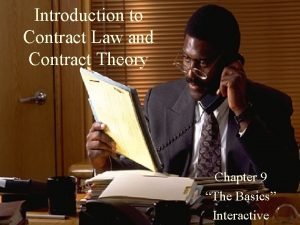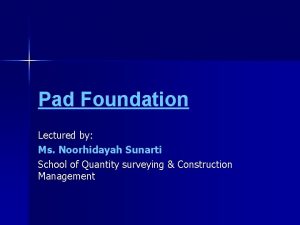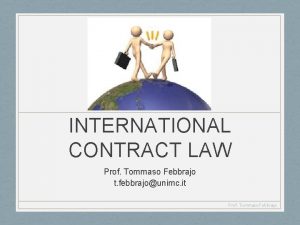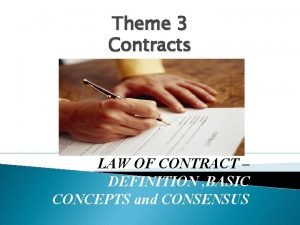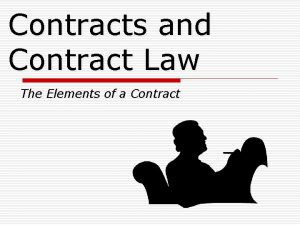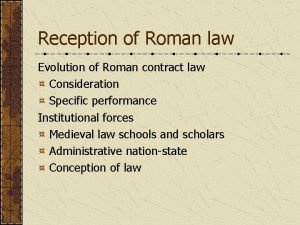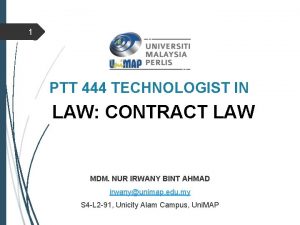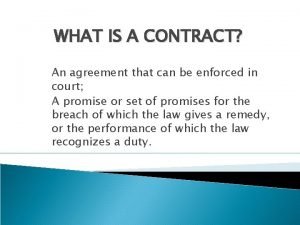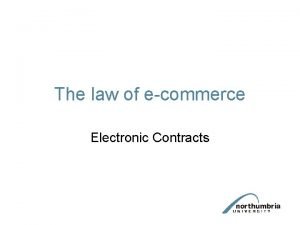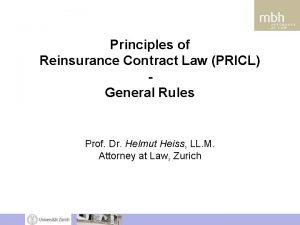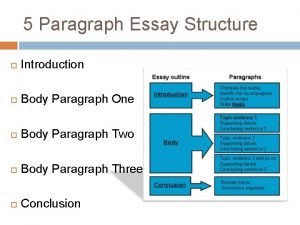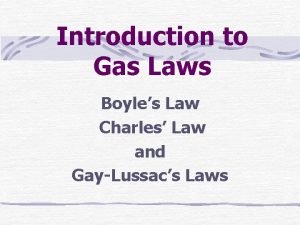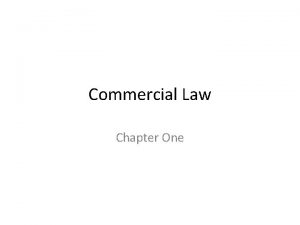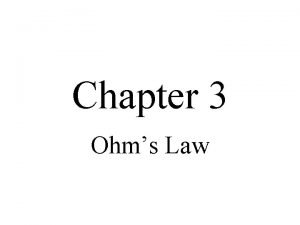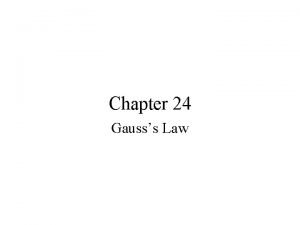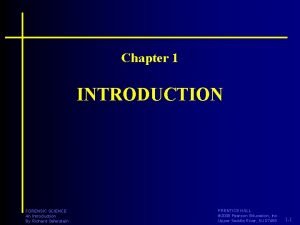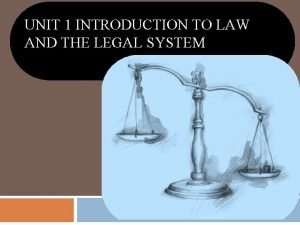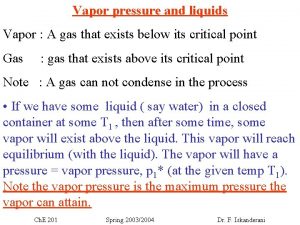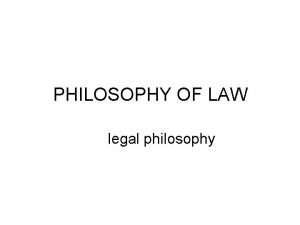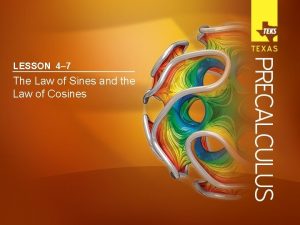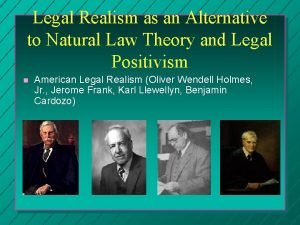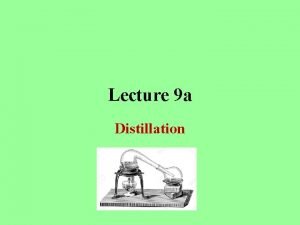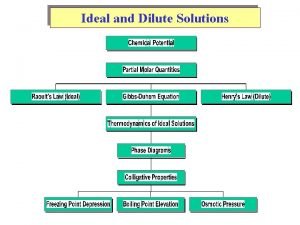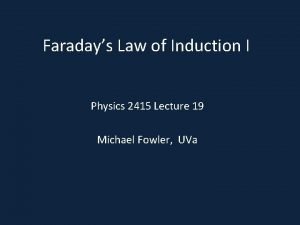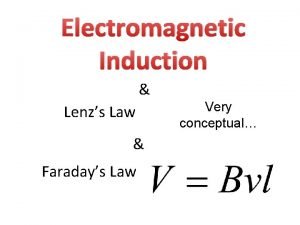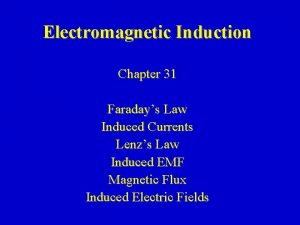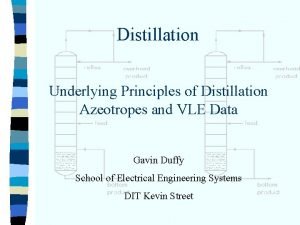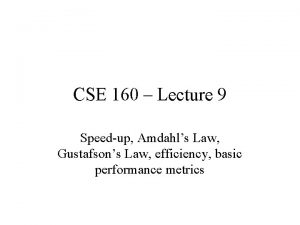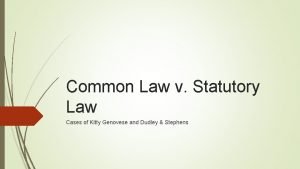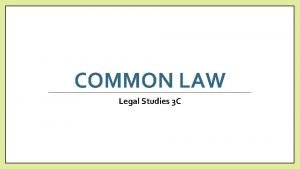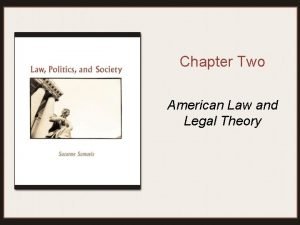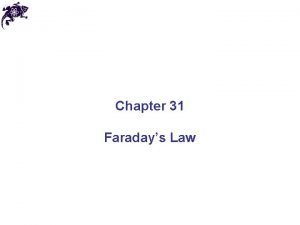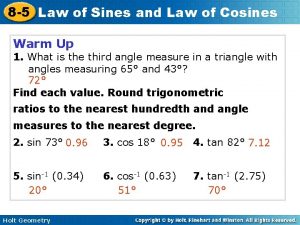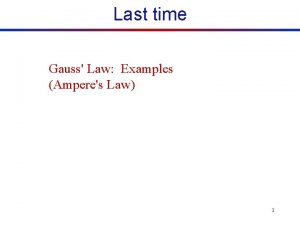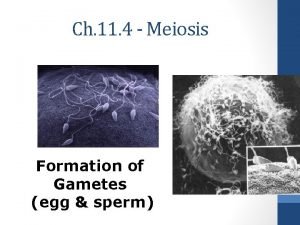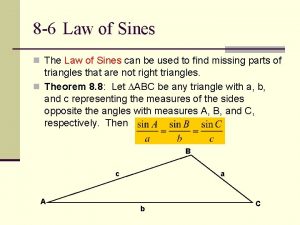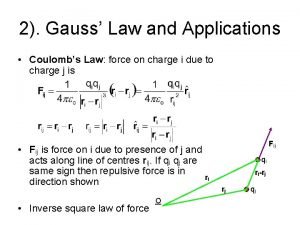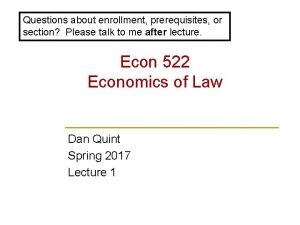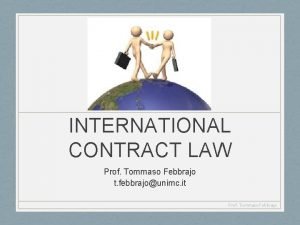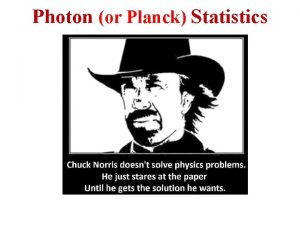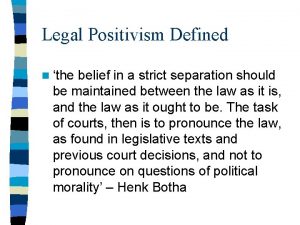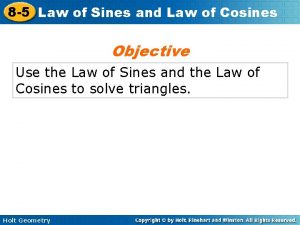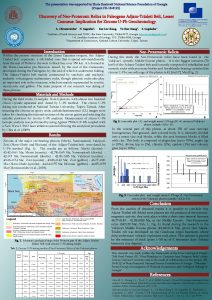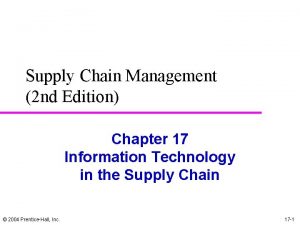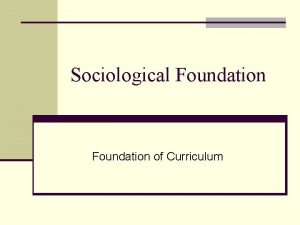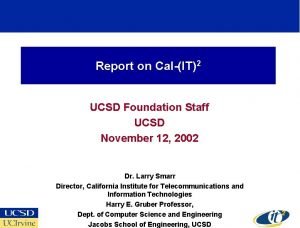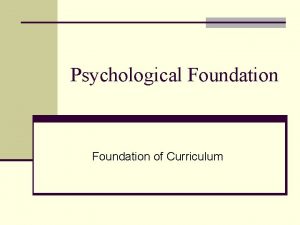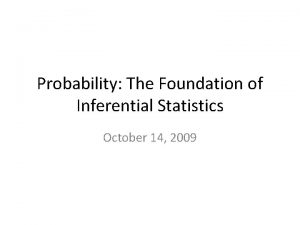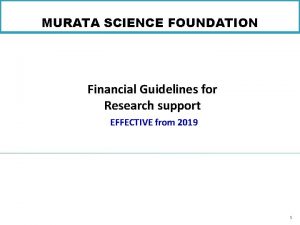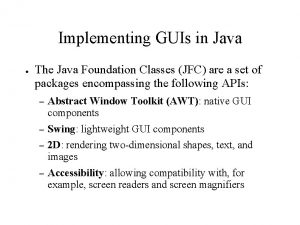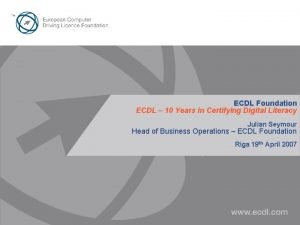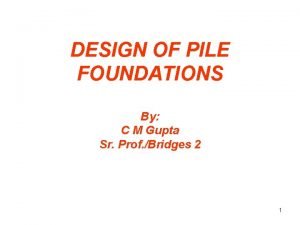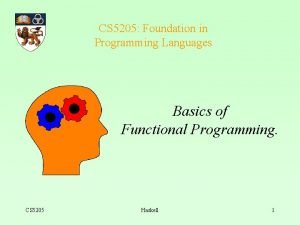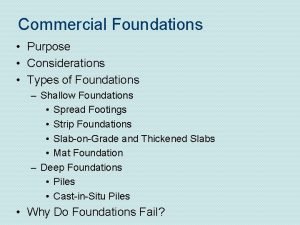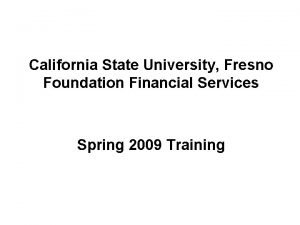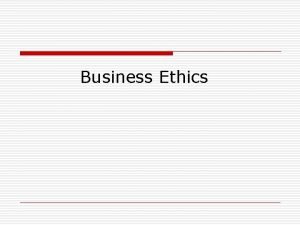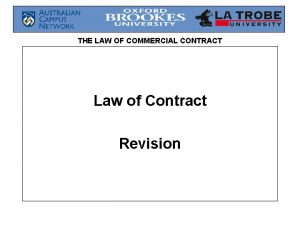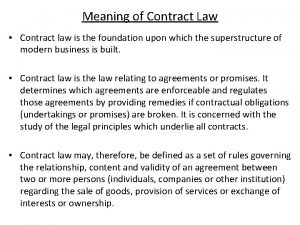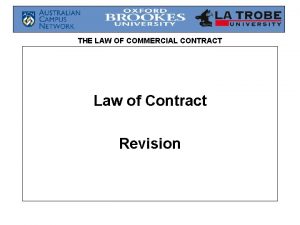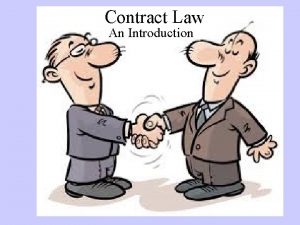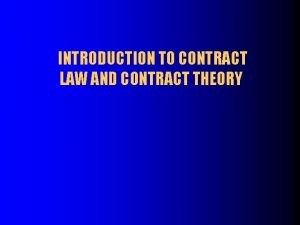LAW OF CONTRACT INTRODUCTION Contract law foundation of







![Carlil vs. Carbolic Smoke Ball Co. [1893] 1 QB 256 The Defendants advertised that Carlil vs. Carbolic Smoke Ball Co. [1893] 1 QB 256 The Defendants advertised that](https://slidetodoc.com/presentation_image_h/96e2786dc5e9a965532732ad666f708e/image-8.jpg)






![Case • Case Harvey vs. Facey[1893]A. C. 552 A send a telegraph to B Case • Case Harvey vs. Facey[1893]A. C. 552 A send a telegraph to B](https://slidetodoc.com/presentation_image_h/96e2786dc5e9a965532732ad666f708e/image-15.jpg)




![Carlil vs. Carbolic Smoke Ball Co. [1893] 1 QB 256 The Defendants advertised that Carlil vs. Carbolic Smoke Ball Co. [1893] 1 QB 256 The Defendants advertised that](https://slidetodoc.com/presentation_image_h/96e2786dc5e9a965532732ad666f708e/image-20.jpg)



![Communication of proposal • Affin Credit (Malaysia) Sdn. Bhd v Yap Yuen Fui [1984] Communication of proposal • Affin Credit (Malaysia) Sdn. Bhd v Yap Yuen Fui [1984]](https://slidetodoc.com/presentation_image_h/96e2786dc5e9a965532732ad666f708e/image-24.jpg)





![EXAMPLE (ITT) Case Partridge v. Crittenden [1968] 1 W. L. R. 1204. Patridge advertised EXAMPLE (ITT) Case Partridge v. Crittenden [1968] 1 W. L. R. 1204. Patridge advertised](https://slidetodoc.com/presentation_image_h/96e2786dc5e9a965532732ad666f708e/image-30.jpg)



![Case Pharmaceutical Society Of Great Britain v Boots Cash Chemist Ltd. [1953] 1 QB Case Pharmaceutical Society Of Great Britain v Boots Cash Chemist Ltd. [1953] 1 QB](https://slidetodoc.com/presentation_image_h/96e2786dc5e9a965532732ad666f708e/image-34.jpg)
![EXAMPLE (ITT) iii. Display Of Good in Shop b) Fisher v. Bell [1961] 1 EXAMPLE (ITT) iii. Display Of Good in Shop b) Fisher v. Bell [1961] 1](https://slidetodoc.com/presentation_image_h/96e2786dc5e9a965532732ad666f708e/image-35.jpg)





![ELEMENTS OF ACCEPTANCE CASE : HYDE V. WRENCH [1840] 3 Beav. 344 ER 132 ELEMENTS OF ACCEPTANCE CASE : HYDE V. WRENCH [1840] 3 Beav. 344 ER 132](https://slidetodoc.com/presentation_image_h/96e2786dc5e9a965532732ad666f708e/image-41.jpg)


![Ramsgate Victoria Hotel Co. Ltd v Montefiore [1866] LR 1 EXCH 109 • Montefiore Ramsgate Victoria Hotel Co. Ltd v Montefiore [1866] LR 1 EXCH 109 • Montefiore](https://slidetodoc.com/presentation_image_h/96e2786dc5e9a965532732ad666f708e/image-44.jpg)


![CASE : IGNATIUS V. BELL [1913]2 F. M. S. L. R. 115. Court held CASE : IGNATIUS V. BELL [1913]2 F. M. S. L. R. 115. Court held](https://slidetodoc.com/presentation_image_h/96e2786dc5e9a965532732ad666f708e/image-47.jpg)








![Guthrie Waugh Bhd v Malaippan Muthucumaru [1972] 1 MLJ 35 • Court Held that Guthrie Waugh Bhd v Malaippan Muthucumaru [1972] 1 MLJ 35 • Court Held that](https://slidetodoc.com/presentation_image_h/96e2786dc5e9a965532732ad666f708e/image-56.jpg)








![Kepong Prospecting Ltd & Ors v Schmidt [1968] 1 MLJ 170 Kepong Prospecting Ltd & Ors v Schmidt [1968] 1 MLJ 170](https://slidetodoc.com/presentation_image_h/96e2786dc5e9a965532732ad666f708e/image-65.jpg)


























![Asia Commercial Finance (M) Bhd. v Yap Bee Lee & Ors. [1991] 1 CLJ Asia Commercial Finance (M) Bhd. v Yap Bee Lee & Ors. [1991] 1 CLJ](https://slidetodoc.com/presentation_image_h/96e2786dc5e9a965532732ad666f708e/image-92.jpg)



















































![Cutter v. Powell [1795] 101 ER 573 Powell agreed to pay Cutter 30 guineas Cutter v. Powell [1795] 101 ER 573 Powell agreed to pay Cutter 30 guineas](https://slidetodoc.com/presentation_image_h/96e2786dc5e9a965532732ad666f708e/image-144.jpg)



![FRUSTRATION 7. Change in law makes performance illegal. - Czarniko Ltd v Rolimpex [1979] FRUSTRATION 7. Change in law makes performance illegal. - Czarniko Ltd v Rolimpex [1979]](https://slidetodoc.com/presentation_image_h/96e2786dc5e9a965532732ad666f708e/image-148.jpg)















- Slides: 163

LAW OF CONTRACT

INTRODUCTION . Contract law = foundation of all commercial activities Wide range of contracts: e. g. simple consumer contracts to construction contracts, sale and purchase agreements in conveyancing transactions

INTRODUCTION Contract May be in: i. writing, or ii. by word of mouth (orally), or iii. by conduct, or iv. by any combination of such.

DEFINITION • The word Contract in a legal sense refers to an agreement between two or more parties that is legally binding between them • Contract defined as an agreement enforceable by the law • Contract is an agreement which is legally binding between the parties. • A contract is an agreement between 2 or more parties which is enforceable at law.

• CONTRACT 1951 i. Section 2(h) “an agreement enforceable by law is a contract; . ”

• CONTRACT 1951 ii. Section 10(1) “ All agreements are contracts if they are made by the free consent of parties competent to contract, for a lawful consideration and with a lawful object, and are not hereby expressly declared to be void. ”

CONTRACT UNILATERAL Calil v. Carbolic Smokeball BILATERAL
![Carlil vs Carbolic Smoke Ball Co 1893 1 QB 256 The Defendants advertised that Carlil vs. Carbolic Smoke Ball Co. [1893] 1 QB 256 The Defendants advertised that](https://slidetodoc.com/presentation_image_h/96e2786dc5e9a965532732ad666f708e/image-8.jpg)
Carlil vs. Carbolic Smoke Ball Co. [1893] 1 QB 256 The Defendants advertised that they would offer a sum of money to anyone who would offer still succumb to influenza after using a certain product according to the instructions for a fixed period. The Plaintiff duly used the product advertised but, nevertheless, became ill. The Plaintiff , upon refusal of the Defendants to honors their promise, proceed to sue them. The Court Of Appeal held that the Plaintiff had accepted the offer of the company made to the world at large and is, therefore, entitled to the money.

CONCEPT 1. General principle: Freedom of contract – Everyone is free to enter into any contract - Without any pressure - Free to decide the terms of contract

ELEMENTS OF CONTRACT

OFFER ACCEPTANCE CERTAINTY OF CONTRACT CONSIDERATION FREEDOM CAPACITY INTENTION TO CREATE LEGAL RELATION

1 OFFER

Definition • An agreement between two or more parties is constitued by a proposal. • An offer or proposal is necessary is for the formation of an agreement • Section 2(a) provides: “When a person signifies to another his willingness to do or to abstain from doing anything with a view to obtaining the assent of that other to the act or abstinence, he is said to make a proposal. ” • Section 2( c ) states that the person who making the proposal is the “promisor”

Example • Ali want to sell his car. He make an offer to Rahim his car for RM 25, 00. If Rahim say yes, the offer is said to be accepted. • When the Offer has been made it become promise. • A person who make an offer is now referred as promisor and the party accepting the proposal as promisee.
![Case Case Harvey vs Facey1893A C 552 A send a telegraph to B Case • Case Harvey vs. Facey[1893]A. C. 552 A send a telegraph to B](https://slidetodoc.com/presentation_image_h/96e2786dc5e9a965532732ad666f708e/image-15.jpg)
Case • Case Harvey vs. Facey[1893]A. C. 552 A send a telegraph to B saying that "Can You sell to us Bumper Hall Pen Hall? Answer for the lowest cash price by telegraph. B replied by telegraph" the lowest price for Bumper Hall Pen is 900 pounds. A send telegraph, we agree to buy Bumper Hall Pen at 900 pounds, as requested by you. A claim that this telegraph exchange was a valid offer and acceptance Privy Council decided that a statement of fact which has been made only to provide information should not be construed as an offer.

Parimala a/p Muthusamy & Ors v Projek Lebuhraya Utara Selatan • The first Plaintif is the wife of the deceased. The First Pl. and a few minors were passengers in a motorcar driven by the deceased. On 6 November 1991, the car entered the highway through the Pagoh Tol gate and was travelling through the northbound lane towards Ayer Keroh at the time of the accident. The deceased died on the spot after hitting a cow which had strayed onto northbound North-South Highway at km 138. 5. The court held that there is a contract between the highway user and the highway operator.

Suriyadi J said: • It is my understanding of the law that the moment a ticket is extracted at the tol gate, as in this case, and the highway is used; a contract is thus struck between the parties, making the plaintif a lawful user of the road

TYPES OF OFFER SPECIFIC OFFER - The Offer only can be accepted by a person who been offer - Case Boulton v. Jones General Offer - Offer is general as it is made to the public - Case Carlill Carbolic Smokeball Co.

Boulton vs. Jones(1857) 2 H & N 564 Defendant have a transaction with a dealer named Brocklehurst. It was an order to buy goods to Brocklehurst, but on the day the order is sent, Brocklehurst has already sold his company to the Plaintiff then send the ordered goods without notifying the Defendant have transfer the ownership of the company. Defendant refused to pay. Court decided that the Plaintiff is not entitled to receive an offer that is not directed to him.
![Carlil vs Carbolic Smoke Ball Co 1893 1 QB 256 The Defendants advertised that Carlil vs. Carbolic Smoke Ball Co. [1893] 1 QB 256 The Defendants advertised that](https://slidetodoc.com/presentation_image_h/96e2786dc5e9a965532732ad666f708e/image-20.jpg)
Carlil vs. Carbolic Smoke Ball Co. [1893] 1 QB 256 The Defendants advertised that they would offer a sum of money to anyone who would offer still succumb to influenza after using a certain product according to the instructions for a fixed period. The Plaintiff duly used the product advertised but, nevertheless, became ill. The Plaintiff , upon refusal of the Defendants to honors their promise, proceed to sue them. The Court Of Appeal held that the Plaintiff had accepted the offer of the company made to the world at large and is, therefore, entitled to the money.

ELEMENTS OF OFFER CERTAINTY OF OFFER - The offer must be firm - There must be a definite intention to adhere to the offer. COMMUNICATION TO OFFER - Complete when it comes to the knowledge of the person to whom it is made by virtue of section 4(1). - Case R v Clarke - Affin Credit (Malaysia) Sdn. Bhd v Yap Yuen Fui

Communication of proposal • Section 4. (1) • The communication of a proposal is complete when it comes to the knowledge of the person to whom it is made.

Communication of proposal • Case R v Clarke ( 1927) 40 CLR 227 – Western Australian government offered a reward for capturing some murderers, Clarke was an accomplice, saw the advertisement but never addressed his mind to it and informed the government • held: no reward to Clark
![Communication of proposal Affin Credit Malaysia Sdn Bhd v Yap Yuen Fui 1984 Communication of proposal • Affin Credit (Malaysia) Sdn. Bhd v Yap Yuen Fui [1984]](https://slidetodoc.com/presentation_image_h/96e2786dc5e9a965532732ad666f708e/image-24.jpg)
Communication of proposal • Affin Credit (Malaysia) Sdn. Bhd v Yap Yuen Fui [1984] 1 MLJ 169 • There was a lack of offer and acceptance, the purported hirepurchase agreement was declared void ab initio, or void from the beginning.

Revocation Of Offer • Section 5. (1) A proposal may be revoked at any time before the communication of its acceptance is complete as against the proposer, but not afterwards. • Ali proposes, by a letter sent by post, to sell his house to Basir accepts the proposal by a letter sent by post. Ali may revoke his proposal at any time before or at the moment when Basir posts his letter of acceptance, but not afterwards.

TERMINATION OF OFFER 1. By acceptance 2. By rejection – a counter-offer is a rejection ; a request for information is not a rejection. 3. By revocation at anytime before acceptance. 4. By lapse of reasonable time. Sec. 6(b) 5. By death of the offeror & Of the offeree. Sec. 6(d) * After termination, the offer is no longer a valid offer and cannot be accepted.

Invitation To Treat • An offer should be contrasted with an option and an advertisement. • An option is merely an undertaking to keep the offer open for a certain period of time. • Advertisement is an attempt to induce offer.

ITT Advertisement Booking Form Display Of Good Tenders

i. EXAMPLE (ITT) Advertisement - An expression of willingness to negotiate, inviting the reader to request the service or goods prescribed. Case Partridge v. Crittenden [1968] 1 W. L. R. 1204. Case Majumder v Attorney-General Of Sarawak
![EXAMPLE ITT Case Partridge v Crittenden 1968 1 W L R 1204 Patridge advertised EXAMPLE (ITT) Case Partridge v. Crittenden [1968] 1 W. L. R. 1204. Patridge advertised](https://slidetodoc.com/presentation_image_h/96e2786dc5e9a965532732ad666f708e/image-30.jpg)
EXAMPLE (ITT) Case Partridge v. Crittenden [1968] 1 W. L. R. 1204. Patridge advertised live wild birds for sale in a periodical bird magazine as “Quality British ABCR …. Bramblefinch cocks for 25 pound each. The advertisements section of the magazine. Patridge was charged with offering live wild birds for sale. Held: The advertisement was only an invitation to treat because nowhere was there any indication of an expression of intention to be bound.

Majumder v Attorney-General Of Sarawak Federal Court held that an advertisement in the newspaper for the post of a doctor was an invitation to treat. The advertisment was in fact merely an invitation to treat which could not be incorporated into the contract.

EXAMPLE (ITT) ii. Booking Form - Normally appended to the brochure is the booking form to be completed by the reader. - The document that will form the first stage in the contractual process.

EXAMPLE (ITT) iii. Display Of Good in Shop - An offer is made when the customer puts the articles in the cashier’s desk. a) Pharmaceutical Society Of Great Britain v. Boots Cash Chemists(Southern) Ltd [1953] 1 QB 401 - Display of drugs – invitation
![Case Pharmaceutical Society Of Great Britain v Boots Cash Chemist Ltd 1953 1 QB Case Pharmaceutical Society Of Great Britain v Boots Cash Chemist Ltd. [1953] 1 QB](https://slidetodoc.com/presentation_image_h/96e2786dc5e9a965532732ad666f708e/image-34.jpg)
Case Pharmaceutical Society Of Great Britain v Boots Cash Chemist Ltd. [1953] 1 QB 401 The Def who ran a self service chemist shop, were charged under the pharmacy and Poison Act 1933 which made it unlawful to sell certain poisons unless such sale was supervised by a registered pharmacist. The case depended on whethere was a sale when a customer selected items he wished to buy and placed them is basket. Payment was to be made at the exit where a cashier was stationed and, in every case involving drugs, a pharmacist supervised the transaction and was authorized prevent a sale. Held ; The display even with prices marked, was only and invitation to treat. A proposal to buy was made when the customer put the articles in the basket. Hence the contract would only be made at the cashier’s desk. As such the chemist in this case had not made an unlawful sale.
![EXAMPLE ITT iii Display Of Good in Shop b Fisher v Bell 1961 1 EXAMPLE (ITT) iii. Display Of Good in Shop b) Fisher v. Bell [1961] 1](https://slidetodoc.com/presentation_image_h/96e2786dc5e9a965532732ad666f708e/image-35.jpg)
EXAMPLE (ITT) iii. Display Of Good in Shop b) Fisher v. Bell [1961] 1 QB 394 - Restriction of Offensive Weapons Act 1959 (UK) “offer for sale” offensive weapons is illegal self service window displaying a flick knife with a price tag – an invitation to treat.

ITT iv. Tenders Invitation for tenders is invitation to treat. It’s also same with bidder which act as an offeror

2 ACCEPTANCE

ACCEPTANCE When the person to whom the proposal is made signifies his assent thereto, the proposal is said to be accepted. When it’s comes into existence after the offeree unconditionally accepts the offer. A proposal when accepted, become a promise. When 1 party introduces variations/conditions to the terms of the latest proposal, there is no acceptance. Such variations/conditions amount to a counter proposal/offer. No agreement.

ACCEPTANCE Sec. 2(b) Contract Act 1950 say that: “ when the person to whom the proposal is made signifies his assent thereto, the proposal is said to be accepted: a proposal, when accepted, becomes a promise; ” * Sec. 2(c) Contract Act 1950 state that: “ The person accepting the proposal is “promisee” • Sec. 9 Contract Act 1950 “So far as the proposal or acceptance of any promise is made in words, the promise is said to be express. So far as the proposal or acceptance is made otherwise than in words, the promise is said to be implied. ”

ELEMENTS OF ACCEPTANCE 1. The acceptance of that proposal must be absolute and unqualified by virtue of section 7(a). Section 7(a) “In order to convert a proposal into a promise the acceptance must— (a) be absolute and unqualified; ”
![ELEMENTS OF ACCEPTANCE CASE HYDE V WRENCH 1840 3 Beav 344 ER 132 ELEMENTS OF ACCEPTANCE CASE : HYDE V. WRENCH [1840] 3 Beav. 344 ER 132](https://slidetodoc.com/presentation_image_h/96e2786dc5e9a965532732ad666f708e/image-41.jpg)
ELEMENTS OF ACCEPTANCE CASE : HYDE V. WRENCH [1840] 3 Beav. 344 ER 132 The Def. offered to sell his estate to the Pl. on 6 Jun for 100 pound. On 8 June, in reply, the Pl. made a counter proposal to purchase at 950 pound. When the Def. refused to accept this offer on 27 June, the Pl. wrote again that he was prepared to pay the original sum demanded. The Court held that no contracted existed between them. The Pl. had rejected the original proposal on 8 June so that he was no longer capable of accepting it later.

ELEMENTS OF ACCEPTANCE CASE : Lau Brothers & Co. v China Pacific Navigation Co. Ltd. [1965] 1 MLJ 1. Negotiations for the delivery of logs were conduct through a series of telegrams and letters. Whilst still in the negotiating stage, the defe. Withdrew. Was there a binding contract between the two parties? The Court held that the parties were still in a state of negotiation and no agreement was formed. Therefore the Def. were justified in withdrawing.

ELEMENTS OF ACCEPTANCE • 2. An acceptance must be made within a reasonable period under section 6(b). “ by the lapse of the time prescribed in the proposal for its acceptance, or, if no time is so prescribed, by the lapse of a reasonable time, without communication of the acceptance; ”
![Ramsgate Victoria Hotel Co Ltd v Montefiore 1866 LR 1 EXCH 109 Montefiore Ramsgate Victoria Hotel Co. Ltd v Montefiore [1866] LR 1 EXCH 109 • Montefiore](https://slidetodoc.com/presentation_image_h/96e2786dc5e9a965532732ad666f708e/image-44.jpg)
Ramsgate Victoria Hotel Co. Ltd v Montefiore [1866] LR 1 EXCH 109 • Montefiore applied for shares on 8 June but he was not told untill 23 November that his offer had been accepted and that the share had been alloted to him and that the balance owing on the shares was now due. Montefiore refused to pay and the company threatened to sue, allerging breach of contract. The issue was whether the offer lapsed through passage of time. The court held that, the offer to purchase shares had not been accepted within a reasonable time and the offer had therefore lapsed. There was no contract created.

ELEMENTS OF ACCEPTANCE 3. Acceptance must be expressed is some usual and reasonable manner, unless the proposer prescribe the manner in which it is to be accepted under section 7(b). Sec. 7(b) “ In oder to convert a proposal into a promise the acceptance must(b) be expressed in some usual and reasonable manner, unless the proposal prescribes the manner in which it is to be accepted. If the proposal prescribes the manner in which it is to be accepted, and the acceptance is not made in that manner, the proposal may within a reasonable time after the acceptance is communicated to him, insist that his proposal shall be accepted in the prescribed manner, and not otherwise; but, if he fails to do so, he accepts the acceptance.

COMMUNICATION OF ACCEPTANCE 1. Acceptance is only effective when it has been communicated. It’s can be made by word or mouth, letter, telex, facsimile or recorded message. 2. In England, the communication of acceptance is complete upon posting. 3. In Malaysia the Contract Act stipulates different times when the communication of an acceptance is complete. - Section 4(2)(a) To Offeror when it is put in a course of transmission to him. - Section 4(2)(b) To Offeree when it comes to the knowledge of the Offeror
![CASE IGNATIUS V BELL 19132 F M S L R 115 Court held CASE : IGNATIUS V. BELL [1913]2 F. M. S. L. R. 115. Court held](https://slidetodoc.com/presentation_image_h/96e2786dc5e9a965532732ad666f708e/image-47.jpg)
CASE : IGNATIUS V. BELL [1913]2 F. M. S. L. R. 115. Court held that there can still be an agreement because the Offeror, though having no knowledge of the acceptance, is bound whilst the acceptor, because his acceptance had not come to the knowledge of the proposer, is not bound.

REVOCATION OF ACCEPTANCE • 1. Section 5(2) An acceptance may be revoked at any time before the communication of the acceptance is complete as against the acceptor, but not afterwards. 2. A proposal may be withdrawn in any of the following circumstances: 2. 1. Communicating the notice of revocation by the proposer to the party to whom the proposal was made under section 6(a). A proposal is revoked— (a) by the communication of notice of revocation by the proposer to the other party;

REVOCATION OF ACCEPTANCE 2. A proposal may be withdrawn in any of the following circumstances: 2. 2. The time prescribed in the proposal for its acceptances elapses, or if no time is prescribed for acceptance, by the lapse of a reasonable time under section 6(b) • A proposal is revoked— (b) by the lapse of the time prescribed in the proposal for its acceptance, or, if no time is so prescribed, by the lapse of a reasonable time, without communication of the acceptance;

REVOCATION OF ACCEPTANCE 2. A proposal may be withdrawn in any of the following circumstances: 2. 3. The failure of the acceptor to fulfill a condition precedent to acceptance under section 6(c ) • A proposal is revoked— (c) by the failure of the acceptor to fulfil a condition precedent to acceptance; or

REVOCATION OF OFFER AND ACCEPTANCE 2. A proposal may be withdrawn in any of the following circumstances 2. 4. The Death or mental disorder come to the knowledge of the acceptor before acceptance under section 6(d) A proposal is revoked— • (d) by the death or mental disorder of the proposer, if the fact of his death or mental disorder comes to the knowledge of the acceptor before acceptance.

COMMUNICATION OF REVOCATION 1. Complete as against the person who makes the revocation when it is put in the course of transmission to the person to whom it is made by virtue of section 4(3)(a) (3) The communication of a revocation is complete— (a) as against the person who makes it, when it is put into a course of transmission to the person to whom it is made, so as to be out of the power of the person who makes it; and 2. Completed as against whom it is made only when it comes to his knowledge by virtue of section 4(3)(b) • (3) The communication of a revocation is complete— (b) as against the person to whom it is made, when it comes to his knowledge.

TAKE HOME QUIZ

3 CONSIDERATION

DEFINATION 1. Consideration is what distinguishes a bargain or contract form gift. 2. Section 26, the general rule in a contract is that an agreement without consideration is void. An agreement made without consideration is void, unless—.
![Guthrie Waugh Bhd v Malaippan Muthucumaru 1972 1 MLJ 35 Court Held that Guthrie Waugh Bhd v Malaippan Muthucumaru [1972] 1 MLJ 35 • Court Held that](https://slidetodoc.com/presentation_image_h/96e2786dc5e9a965532732ad666f708e/image-56.jpg)
Guthrie Waugh Bhd v Malaippan Muthucumaru [1972] 1 MLJ 35 • Court Held that there was no cause of action in the statement of claim as the claim was base on deed of arrangement for which there was no consideration,

DEFINATION 3. Section 2(d) defined the word consideration is when at the desire of the promisor, the promisee or any other person has done or abstained from doing, or does or abstains from doing, or promises to do or abstains from doing, something, such act or abstinence or promise is called a consideration for the promise.

DEFINATION 1. Something of value in the eyes of the law (need not be of market value). 2. Hence, the saying : ”Consideration must be sufficient but not adequate. ” Chappel & Co. Ltd v Nestle Co. Ltd [1960] AC 87 Phang Swee Kim v Beh I Hock [1964] MLJ 383

DEFINATION

DEFINATION

DEFINATION 3. Price to be paid for the promise. May consists of money, goods, promise, suffering some detriment (e. g. forbearance to sue). In Curie v. Misa. The court held that a valuable consideration in the sense of the law may consist either in some right, interest, profit or benefit acruing to one party, or some forbearance, detriment, loss or responsibility given, suffered or undertaken by the other.

DEFINATION 3. Price to be paid for the promise. May consists of money, goods, promise, suffering some detriment (e. g. forbearance to sue). 4. Consideration must flow from the propose in respect of any promise.

TYPES OF CONSIDERATION 1. Past Consideration 2. Executed Consideration 3. Executory Consideration

TYPES OF CONSIDERATION 1. Past Consideration - Something wholly performed before the promise was made. - Under the English Law past consideration is not a good consideration. However in Malaysia, Past Consideration is a good consideration.
![Kepong Prospecting Ltd Ors v Schmidt 1968 1 MLJ 170 Kepong Prospecting Ltd & Ors v Schmidt [1968] 1 MLJ 170](https://slidetodoc.com/presentation_image_h/96e2786dc5e9a965532732ad666f708e/image-65.jpg)
Kepong Prospecting Ltd & Ors v Schmidt [1968] 1 MLJ 170

TYPES OF CONSIDERATION 2. Executed Consideration - An act which has been done to fulfill the contract. 3. Executory Consideration - An act or promise that will be done in future

Natural Love And Affection • Agreement made on account of natural love and affection would be held to be binding in Malaysia but not in England.

Natural Love And Affection • Section 26(a) An agreement made without consideration is void, unless— it is in writing and registered (a) it is expressed in writing and registered under the law (if any) for the time being in force for the registration of such documents, and is made on account of natural love and affection between parties standing in a near relation to each other;

Tan Soh Sim, Chan Law Keong & Ors v Tan Saw Keow & Ors [1951] MLJ 21

4 INTENTION TO CREATE LEGAL RELATIONS

1. All contract is an agreement and not all agreement is contract. 2. Intention is the most important element which will change an agreement to contract. 3. Although the Contract Act is silent on the intention to create legal relations as one of the requirements of a valid contract, case law clearly dictates the necessity of this requirement.

4. Case Dalrymple v Dalrymple 5. Both parties must intend that the agreement is to be binding on them (i. e. they have agreed to bear the duties under the contract). • Objective test : reasonable man’s test

COURT PRESUMPTION 1. No legal intention i. Family Agreement (Domestic) ii. Case Balfour v. Balfour 2. Legal Intention i. All Commercial arrangement

5 CAPACITY

CAPACITY 1. The parties entering into a contract should be competent to contract according to the law which is subject, and of sound mind. 2. In principle, every person is qualified to contract. • The question is who is competent to contract?

According to S. 11, a person who has not reached the age of majority is not competent to contract a) Contract by a Minor Except for S. 10, the Contracts Act does not explain the effects of a contract made by a minor. S. 10 states „all agreements are contracts if they are made by parties competent to contract. In short, every agreement made by a minor is, by S. 11 of the Contracts Act 1950, not a contract

Capacity Sec. 11 Contract Act 1950 – Who Is Competent Every person is competent to contract who is of the age of majority according to the law to which he is subject, and who is sound of mind, and is not disqualified from contracting by any law to which he is subject

Capacity as to Age According to the Age of Majority Act 1971, for every individual person, the age of majority is 18 years old.

Contract By Minor 1. Every Agreements made by a minor is not a contract – Sec 11. 2. For example – Ahmad, who is 13 years old, enters an electrical goods shop and purchase, on installment, a television set from Brahim. When Ahmad fails to pay the installment, Brahim sues Ahmad for breach of contract.

Mohori Bibee v Dharmodas Ghose The Appellant in this case loan a sum of money to the respondent, who is a minor, secured on a house which was leased to the appellant. The minor through his mother applied for a court declaration that the lease was void because the minor had no capacity to contract.

Court Judgemnet According to sec. 9 and sec. 10 of the Indian Contract act, which is in pari materia to Sec. 10 and Sec. 11 of The Malaysian Contract Act, a Contract by a minor was void. The Contract with the minor was void and he could not sue or be sued on any contract

CAPACITY 1. Case Tah Hee Juan v. Teh Boon Keat Case; Tranfer Land by a minor…. Hereford J. said the contract is void.

EXCEPTION Contract By A Minor Under Age Of Majority Act 1971 An Act allowed under any law. Contract For Necessary

Age Of Majority Act 1. Marriage, Divorce, dowries and child adoption. Rajeshwary Anor v Balakrishnan Ors. 2. Religion an religious practices and ceremonies of the races in Malaysia. 3. Case Rajeswary v. Balakrishnan Court held that when defendant broke his promise of marriage with plaintiff, the defendant was according to their religious practice, in breach of his contract of marriage, even plaintiff was a minor.

An Act Under Any Law 1. Election Act– 21 years old. 2. The Employment Act 1955 – 14 years old 3. Contract (Amendment) Act 1976 – Scholarship 4. Insurance Act 1996 – 10 years old(with consent )

EXCEPTION 1. There is a few exception for this element which has been given by Contract Act 1971. 2. Section 69 “ If a person, incapable of entering into a contract, or any one whom he is legally bound to support, is supplied by another person with necessaries suited to his condition in life, the person who has furnished such supplies is entitled to be reimbursed from the property of such incapable person”

NECESSARY FOR MINOR 1. Contract Act 1971 did not defined the service that necessary for minor’s life. 2. Common Law give us the necessary thing for minor’s life; 2. 1. Cloth 2. 2. Medical Treatment 2. 3. House 2. 4. Food 2. 5. Education 2. 6. Professional Training 2. 7. Scholarship 2. 8. Insurance

Sound Mind vs. Unsound Mind

Mental Capacity A contract is formed pursuant to consensus of minds on a matter. What is the significance of soundness of mind? What is unsound mind? Unsoundness of mind which causes incapacity to contract covers usual unsoundness of mind and occasional unsoundness of mind.

Section 12 1. A person who sound of mind can make a contract if at the time when he makes it, he is capable of understanding it and of forming a rational judgment as to its effect upon his interest. 2. A person who is usually of unsound mind, but occasionally of sound mind, may make a contract when he is of sound mind. 3. A person who is usually of sound mind, but occasionally of unsound mind, may not make a contract when he is of unsound mind.

According to English Law, a contract made by a person of unsound mind is not void contract but voidable at the option of the party who is of unsound mind. Imperial Loan Co. v. Stone Che Som Bt. Yip & Ors v. Maha Pte Ltd & Ors.
![Asia Commercial Finance M Bhd v Yap Bee Lee Ors 1991 1 CLJ Asia Commercial Finance (M) Bhd. v Yap Bee Lee & Ors. [1991] 1 CLJ](https://slidetodoc.com/presentation_image_h/96e2786dc5e9a965532732ad666f708e/image-92.jpg)
Asia Commercial Finance (M) Bhd. v Yap Bee Lee & Ors. [1991] 1 CLJ 271 The court stated that a person of sound mind who intended to rescind a contract which he had entered into, on the grounds of unsoundness of mind must prove two things, that is he was of unsound mind and the fact of the unsoundness of his mind was known to the other party at the time of entering into the contract.

6 FREEDOM

1. Parties should entered any contract freely without any pressure from other parties. 2. S. 10 states that every agreement is a contract if it is made by the free consent of the parties.

• On that basis, every contract must be voluntarily done without any negative element which affects a person’s capacity to make independent decisions. • Independent decisions are decisions which are made after due consideration of the effects of a contract on the person.

FREEDOM IN CONTRACT 1. Section 14 Contract Act 1950 stated that any parties who entered any contract consider freely if they entered it without : 2. 1. Coercion – Sec. 15 2. 2. Undue Influence – Sec. 16 2. 3. Fraud – Sec. 17 2. 4. Misrepresentation – Sec. 18 2. 5. Mistake, subject to section 21, 22 & 23.

Coercion – Sec. 15 • The definition of coercion is merely a definition applied in assessing whether or not there is free consent to an agreement to make it a contract • According to S. 15, coercion is divisible into two categories, that is physical coercion and economic coercion.

• According to S. 15, coercion may be committed on a person’s body by the commission of an offence under the Penal Code, or threatening to commit such acts with the intention of causing any person to enter into an agreement. • Illustration : • A inherited a piece of land. B asks A to sell him the piece of land. When A refuses, B threatens A with assault.

Economic Coercion Case North Ocean Shipping Co. Ltd v. Hyundai Construction Co. Judge in English Court held that economic coercion was a factor which may render a contract voidable.

Sec. 19 A contract made under coercion is a valid contract, but voidable contract.


Undue Influence • Undue influence, according to S. 14(b), causes a person’s consent • The position of a party to dominate the will of another in a contract is the basis of undue influence. This position may either

Undue Influence • Sec. 16 - Undue Influence is a situation where one of the parties is in position to dominate the will of the other.

Determine UI 1. Adduced from evidence. 2. Court Presumption

Adduced From Evidence. 1. A person claim for Undue Influence during the contract signing have to proof by himself 2. Case Allcard v Skinner - English Court Judge.

Court Presumption 1. A person is in a position to dominate the will and decision of the other party if he holds a real or apparent authority over that other party. 2. Where there is a fiduciary relationship between the parties to the contract.


Section 20 • An agreement entered into under influence shall be voidable at the option of the victim

Fraud Section 17 (a) – (d) The suggestion, as to fact, which is not true, by a person who does not believe it to be true Active concealment of a fact by a person who has knowledge of the fact A promise made without any intention of performing it. Any other act intended to deceive Any act as the law specially declares to be fraudulent.



Effect & Remedy

Misrepresentation Forms Of Misrepresentation 1. A statement which is not true, though belived to be true by the representor. 2. A breach of duty by a party which gives him an advantage over the other party. 3. Causing a party to a contract to make a mistake as to the substance of the thing which is the subject of the contract.

Misrepresentation Condition Of Misrepresentation The representation must be untrue The representation is a statement of fact The representation is addressed to the person deceived The representation induces the contract


Misrep vs Fraud

Mistake • Sec. 21 - Where both the parties to an agreement are under a mistake as to a matter of fact essential to the agreement, the agreement is void.

• (a) A agrees to sell B a specific cargo of goods supposed to be on its way from England to Kelang. It turns out that, before the day of the bargain, the ship conveying the cargo had been cast away and the goods lost. Neither party was aware of the facts. The agreement is void. • (b) A agrees to buy from B a certain horse. It turns out that the horse was dead at the time of the bargain, though neither party was aware of the fact. The agreement is void. • (c) A, being entitled to an estate for the life of B, agrees to sell it to C. B was dead at the time of the agreement, but both parties were ignorant of the fact. The agreement is void.

Mistake • Sec. 22 - A contract is not voidable because it was caused by a mistake as to any law in force in Malaysia; but a mistake as to a law not in force in Malaysia has the same effect as a mistake of fact. • ILLUSTRATION A and B make a contract grounded on the erroneous belief that a particular debt is barred by limitation: the contract is not voidable.

Mistake • Sec. 23 - A contract is not voidable merely because it was caused by one • of the parties to it being under a mistake as to a matter of fact.

Sheikh Brothers Ltd v. Ochne

7 CERTAINTY OF CONTRACT

CERTAINTY OF CONTRACT 1. Any contract should be legal 2. The terms of a contract must be certain and not vague. 3. Any Agreements which is not certain or capable of being made certain, are void under sec. 30 “ Agreement, the meaning of which is not certain, or capable of being made certain, are void. ”

CERTAINTY Every term of an agreement must be certain or capable of being ascertained. Where the terms of an agreement are not certain, the contract may be void. This is stated in S. 30 CA 1950. For explanation, please refer to llustrations (a), (c), (d) and (f) to S. 30.

(a)A agrees to sell to B “a hundred tons of oil”. There is nothing whatever to show what kind of oil was intended. The agreement is void for uncertainty. (c) A, who is a dealer in coconut oil only, agrees to sell to B “one hundred tons of oil”. The nature of A’s trade affords an indication of the meaning of the words, and A has entered into a contract for the sale of one hundred tons of coconut oil.

(d) A agrees to sell to B “all the grain in my granary at Ipoh”. There is no uncertainty here to make the agreement void. (f) A agrees to sell to B “my white horse for five hundred ringgit or one thousand ringgit”. There is nothing to show which of the two prices was to be given. The agreement is void.

TERMS AND CONDITION

TERMS OF CONTRACT 1. It is essential requirement for a contract to be legally binding that the parties have reached the agreement. 2. This term of agreement which they have set out, in writing and partly verbally. 3. These terms of the agreement which they have set out, in writing, verbally or a mixture of the two are known as express terms.

TERMS OF CONTRACT 1. These terms has been divided into to types; i. Express Terms - Terms that are expressed agreed by the parties orally, in writing or partly orally, party in writing. ii. Implied Terms - Terms that work on the presumed intention of the parties to give effect to the business efficacies of the contract.


TERMS OF CONTRACT 2. The express and implied terms are divided to conditions and warranties. 3. Condition are stipulations essential to the main purpose of the contract. If there any breach of condition, the injured party may only claim for damages

TERMS OF CONTRACT 3. Condition are stipulations essential to the main purpose of the contract. If there any breach of condition, the injured party may only claim for damages

Kes Bettini v. Gye • Pl. is a singer, agreed with the Def. A Director of the Italian Opera in London, that he would sing in the Def’s theatres, hall, and drawing rooms in the UK from 30 March 1875 untill 13 July 1875 at a salary of 501 pound per month. Pl. also agreed that he would attend at least six days of rehearsals. Due to a temporary illness, Pl. only arrived in London on 28 March 1875. Def. refused to received Pl. into his service and repudiated the contract on the ground that the Pl. had breached the contract by not attending the six days of rehearsal.

Kes Bettini v. Gye • The court held that stipulation as to the rehearsals was not a condition of the contract as it did not go to the root of the matter.

DISCHARGE OF CONTRACT

DISCHARGE OF CONTRACT 1. Discharge of contract is an example way for the parties to separated from the agreement. 2. There are four ways to discharge; DISCHARGE OF CONTRACT PERFORMANCE BREACH AGREEMENT FRUSTRATION

PERFORMANCE Performance Of a contract must be exact and precise and should be in accordance with what the parties had promised. • CONTRACT Sec. 38(1) The parties to a contract must either perform, or offer to perform, their respective promises, unless the performance is dispensed with or excused under this Act, or of any other law. • If Hasnah promise to deliver goods to Khairi on 1 st January 2015 on payment of RM 5, 000. 00, Hasnah is bound to deliver the goods to Khairi on that day and Khairi is bound to pay the RM 5, 000.

AGREEMENT 1. When there is a new agreement between parties. 2. The new agreement abolish the old agreement.

BREACH 1. Whera a party fails to perform their obligations as agreed, they are in breach of contract. 2. No performance by the contracted time, place and conditions. 3. A party express its intention not to perform. 4. A party acts in such a way as to sow its intention not to perform.

BREACH 5. Failure to comply with a term of the contract.

DOCTRINE OF FRUSTRATION

FRUSTRATION • Sec. 57(1) – any agreement impossible to proceed is void. • Sec. 57(2) - A contract to do an act which, after the contract is made, becomes impossible, or by reason of some event which the promisor could not prevent, unlawful, becomes void when the act becomes impossible or unlawful.

FRUSTRATION • Sec. 57(3) – Where one person has promised to do something which he knew, or, with reasonable diligence, might have known, and which the promisee did not know, to be impossible or unlawful, the promisor must make compensation to the promisee for any loss which the promisee sustains through the non-performance of the promise.
![Cutter v Powell 1795 101 ER 573 Powell agreed to pay Cutter 30 guineas Cutter v. Powell [1795] 101 ER 573 Powell agreed to pay Cutter 30 guineas](https://slidetodoc.com/presentation_image_h/96e2786dc5e9a965532732ad666f708e/image-144.jpg)
Cutter v. Powell [1795] 101 ER 573 Powell agreed to pay Cutter 30 guineas if he would sail as second mate in a vessel from Jamaica to Liverpool. This was a higher rate than normal for such a voyage. He died at sea before the completion of the voyage. Cutter’s widow attempted to recover a proportion of the agreed sum of 30 guineas. The court held that as Cutter had promised to serve as second mate for the whole of the voyage but had not done so, the widow failed in her claim. The contract was not divisible as the payment was supposed to be full payment upon completion of the whole voyage. Since Cutter did not perform his promise, there was no right for the widow to any part of the salary.

1. Without fault of either party. - A contractual obligation has become incapable of being performed because circumstances in which performance is called for would render it a thing radically different from that which was undertaken. . ” per Lord Radcliffe in Davis Contractors v Fareham UDC [1956] ACC 696 i. Failure to obtain a license, ii. natural disasters, iii. court order.

2. Extraneous change of circumstances which makes performance impossible Effect: Both parties need not perform – contract discharge 3. Subject matter destroyed - Taylor v Caldwell (1863) 3 B & S 826 – Hall destroyed by fire – contract discharged.

FRUSTRATION 4. Expected event does not occur : Coronation cases : Kr. Vell v Henry [1903] 2 KB 740: King George VI sicked – rented premises not served its purpose – contract discharged. 5. Person to perform dies or falls ill: Robison v Davison (1871) LR Ex 269: performer sicked on performance day – contract discharged. 6. Change in law making it impossible to perform: Baily v Dee Crespigny (1869) LR 4 QBB 180: no blockade clause turns impossible because of change of law – contract discharged
![FRUSTRATION 7 Change in law makes performance illegal Czarniko Ltd v Rolimpex 1979 FRUSTRATION 7. Change in law makes performance illegal. - Czarniko Ltd v Rolimpex [1979]](https://slidetodoc.com/presentation_image_h/96e2786dc5e9a965532732ad666f708e/image-148.jpg)
FRUSTRATION 7. Change in law makes performance illegal. - Czarniko Ltd v Rolimpex [1979] AC 351: export of goods impossible because of change in law – discharged 8. Performance become radically different. - Wong Lai Ying v Chinachem [1980] HKLR 1: landslide stopped construction work for 3. 5 years – discharged.

FRUSTRATION 9. Government intervention involving a contract basis - Kes Metropolitan Water Board v. Dick, Ker & Co. Ministry of war has ordered the construction of a water tank stopped. 10. War - Berney v. Tronoh Mines contract entered into before the war

Effects Of Frustration • The effect of a frustrating event is to discharge a contract immediately, but only to the future. • The contract is not void ab initio, but only void from the time of the frustrating event.

REMEDIES

REMEDIES 1. If there is breach of contract has been made, other parties who suffered damage can take action to recovered his loss. 2. Breach of contract mean any parties who breach any terms in the agreement.

REMEDIES DAMAGES REMEDIES EKUITY Unliquidated damages Specific Performance Liquidated Injunction

Damages • Section 74 of Contract Act 1950 , an innocent party may claim damages from the party in breach in respect of all breaches of contract. • The damages may be nominal or substantial. • Nominal damages are awarded where the innocent party has suffered no loss as a result of the other's breach.

Damages • Section 75 of Contract Act 1950 When a contract has been broken, if a sum is named in the contract as the amount to be paid in case of such breach, or if the contract contains any other stipulation by way of penalty, the party complaining of the breach is entitled, whether or not actual damage or loss is proved to have been caused thereby, to receive from the party who has broken the contract reasonable compensation not exceeding the amount so named or, as the case may be, the penalty stipulated for.

Damages • Substantial damages are awarded as monetary compensation for loss suffered as a result of the other party's breach. • For an innocent party to obtain substantial damages he must show that he has suffered loss as a result of the breach (remoteness) and the amount of his loss (measure). It is up to the party in breach to argue that the innocent party has failed to mitigate his loss. This is an equitable remedy granted at the court's discretion

Brown v. Hilton Hotels Corp The hotel failed to honour Pl. confirmed reservations. Pl. were unabled to find other accormmodations and so were forced to fly home. The Pl sought and received damages for breach of contract.

Specific performance • Specific performance is a discretionary remedy granted by the court, and it is under the Specific Relief Act 1950. • It is a decree by the court to compel a party to perform his contractual obligations. • It is usually only ordered where damages are not an adequate remedy.

Specific performance • It is a general rule that specific performance will not be ordered if the contract requires performance or constant supervision over a period of time and the obligations in the contract are not clearly defined. • Specific performance is often ordered in relation to building contracts because the contract deals with results rather than the carrying on of an activity over a period of time and it usually defines the work to be completed with certainty

Injunction • Injunction is classified under Part III of the Specific Relief Act 1950 as ‘Preventive Relief’. • It is an equitable remedy and therefore only granted at the discretion of the court. • It is awarded in circumstances where damages would not be an adequate remedy to compensate the claimant because the claimant needs to restrain the defendant from starting or continuing a breach of a negative contractual undertaking (prohibitory injunction) or needs to compel performance of a positive contractual obligation (mandatory injunction).

Injunction • In exercising its discretion the court will consider the same factors as above for specific performance and will use the balance of convenience test (weighing the benefit to the injured party and the detriment to the other party). • An injunction will not be granted if its effect would be to compel a party to do something which he could not have been ordered to do by a decree of specific performance.

Reference 1. Mengenali Undang-Undang Kontrak Malaysia By Sakina Shaik Ahmad Yusoff. 2. Business Law In Malaysia By Nuraisyah Chua Abdullah 3. Malaysian Busines Law By Nurdianawati 4. Other Malaysian Contract Law Books

Reference 1. Contract Act 1950 2. Malayan Law Journal 3. Current Law Journal
 Introduction of contract
Introduction of contract Classification of contract
Classification of contract Pad foundation
Pad foundation Composition of urine slideshare
Composition of urine slideshare 5 step model ifrs 15
5 step model ifrs 15 Contingent contract and wagering contract
Contingent contract and wagering contract Introduction of foundation
Introduction of foundation Steining of well
Steining of well Newton's first law and second law and third law
Newton's first law and second law and third law Si unit of newton's first law
Si unit of newton's first law V=k/p
V=k/p Constant in avogadro's law
Constant in avogadro's law Introduction to contract management
Introduction to contract management Difference between contract and agreement
Difference between contract and agreement International contracts
International contracts Contract law definition
Contract law definition Agreement definition in law
Agreement definition in law 6 elements of a contract
6 elements of a contract Reception of roman law
Reception of roman law Price variation clause contract law
Price variation clause contract law Contract capacity
Contract capacity Quasi contract in business law
Quasi contract in business law Postal rule
Postal rule What is a contingent contract
What is a contingent contract Pricl
Pricl Intro paragraph outline
Intro paragraph outline Illustration of charles law
Illustration of charles law Define commercial law
Define commercial law Ohms law introduction
Ohms law introduction Gauss
Gauss Chapter 1 intro to forensic science
Chapter 1 intro to forensic science Introduction to english law
Introduction to english law Unit 1 introduction to law and the legal system
Unit 1 introduction to law and the legal system Raoult's law and dalton's law
Raoult's law and dalton's law Difference between civil law and criminal law
Difference between civil law and criminal law Positive law vs natural law
Positive law vs natural law Positive law vs natural law
Positive law vs natural law Stoicism natural law
Stoicism natural law Law of segregation vs law of independent assortment
Law of segregation vs law of independent assortment 4-7 the law of sines and the law of cosines answers
4-7 the law of sines and the law of cosines answers Legal realism vs natural law
Legal realism vs natural law Distillation introduction
Distillation introduction Difference between civil law and criminal law
Difference between civil law and criminal law Thermodynamics equations
Thermodynamics equations Law of independent assortment vs law of segregation
Law of independent assortment vs law of segregation Lenz's law
Lenz's law Faraday's law vs lenz's law
Faraday's law vs lenz's law Induced electric field
Induced electric field Raoult's law vs dalton's law
Raoult's law vs dalton's law Amdahl's law
Amdahl's law Difference between statute and common law
Difference between statute and common law Common law australia
Common law australia Principles of natural law
Principles of natural law Faraday's law vs lenz law
Faraday's law vs lenz law Natural law vs positive law
Natural law vs positive law Private law vs public law
Private law vs public law Lesson 8-5 practice b law of sines and law of cosines
Lesson 8-5 practice b law of sines and law of cosines The vapor pressure of pure water at 110 c is 1070 torr
The vapor pressure of pure water at 110 c is 1070 torr Newton's second law
Newton's second law Are we getting
Are we getting Independent assortment in meiosis
Independent assortment in meiosis 8-6 the law of sines
8-6 the law of sines Law is order and good law is good order
Law is order and good law is good order Recto law and maceda law
Recto law and maceda law Vector form of gauss law
Vector form of gauss law Common law and civil law
Common law and civil law Common law and civil law
Common law and civil law Common law and civil law
Common law and civil law F
F R in coulomb's law
R in coulomb's law Planck radiation law
Planck radiation law Trigonometry cosine rule
Trigonometry cosine rule Natural law and positive law
Natural law and positive law 8-5 law of sines
8-5 law of sines Windows platform foundation
Windows platform foundation Windows communication foundation wcf performance
Windows communication foundation wcf performance Dr. mason moore
Dr. mason moore What is reading
What is reading Cushing's research and support foundation
Cushing's research and support foundation Foundation stage 2
Foundation stage 2 New orleans police foundation
New orleans police foundation Who nursing definition
Who nursing definition Cosine questions
Cosine questions Chijnaya foundation
Chijnaya foundation Wise foundation j1 visa
Wise foundation j1 visa Sti foundation
Sti foundation Shota rustaveli national science foundation
Shota rustaveli national science foundation Gcse grades
Gcse grades Microsoft foundation class library
Microsoft foundation class library Learning foundation and performing arts gilbert
Learning foundation and performing arts gilbert Wise work and travel
Wise work and travel Finnish cultural foundation grants
Finnish cultural foundation grants Clara abbott
Clara abbott Clara foundation abbott
Clara foundation abbott Team foundation server demo
Team foundation server demo Transaction management foundation
Transaction management foundation Thickening agents for sauce
Thickening agents for sauce Stephen oluwole awokoya foundation
Stephen oluwole awokoya foundation Social foundation of curriculum
Social foundation of curriculum Iqro foundation
Iqro foundation Pengertian iqro
Pengertian iqro Severn foundation school
Severn foundation school Arizona leadership foundation
Arizona leadership foundation Poly foundation programme
Poly foundation programme Refngo
Refngo Russian peace foundation
Russian peace foundation Keshav sita memorial foundation trust
Keshav sita memorial foundation trust Japanese foundation sydney
Japanese foundation sydney Ucsd bioengineering flowchart
Ucsd bioengineering flowchart Team foundation server scrum
Team foundation server scrum Foundation ratio questions
Foundation ratio questions Behaviorism curriculum
Behaviorism curriculum Holistic life foundation
Holistic life foundation Professor mark ferguson
Professor mark ferguson Empirical method probability
Empirical method probability Nursing patient positions
Nursing patient positions Peralta foundation
Peralta foundation Foundation intermediate advanced
Foundation intermediate advanced National education foundation nef
National education foundation nef The murata science foundation
The murata science foundation Theoretical foundation of nursing reviewer
Theoretical foundation of nursing reviewer Motorcycle riders foundation
Motorcycle riders foundation Systemparametersinfo
Systemparametersinfo Who is mevlana
Who is mevlana Gplms
Gplms Beau biden foundation
Beau biden foundation Garry tetalman
Garry tetalman Knights templar foundation
Knights templar foundation Israel science foundation
Israel science foundation Irving schools foundation
Irving schools foundation Shallow and deep foundation
Shallow and deep foundation Place value gcse
Place value gcse Krishnamoorthy yoga foundation
Krishnamoorthy yoga foundation List button
List button W68 foundation stick
W68 foundation stick Historical basis of curriculum
Historical basis of curriculum Beet box market
Beet box market Ghana physicians and surgeons foundation
Ghana physicians and surgeons foundation Foundation engineering lecture notes
Foundation engineering lecture notes Ccea analytics
Ccea analytics Business intelligence databases
Business intelligence databases Audiology foundation degree
Audiology foundation degree Fisco foundation fieldbus
Fisco foundation fieldbus I am standing on the rock my firm foundation
I am standing on the rock my firm foundation Strip foundation diagram
Strip foundation diagram What is the highest mark you can get on a foundation paper
What is the highest mark you can get on a foundation paper Assignment on entrepreneurship development
Assignment on entrepreneurship development Employability skills
Employability skills Foundation standard 4 employability skills
Foundation standard 4 employability skills Global leadership foundation emotional intelligence test
Global leadership foundation emotional intelligence test Foundation species examples
Foundation species examples Ecdl foundation
Ecdl foundation Doris duke foundation for islamic art
Doris duke foundation for islamic art Codal alignment
Codal alignment Foundation programming
Foundation programming Contraindications of composite restoration
Contraindications of composite restoration Foundation species examples
Foundation species examples Purpose of foundation in building
Purpose of foundation in building Lcif coordinator
Lcif coordinator Factors affecting oxygen administration
Factors affecting oxygen administration Foundation plan layout
Foundation plan layout Foundation plan layout
Foundation plan layout Csu fresno foundation
Csu fresno foundation Power sharing
Power sharing
